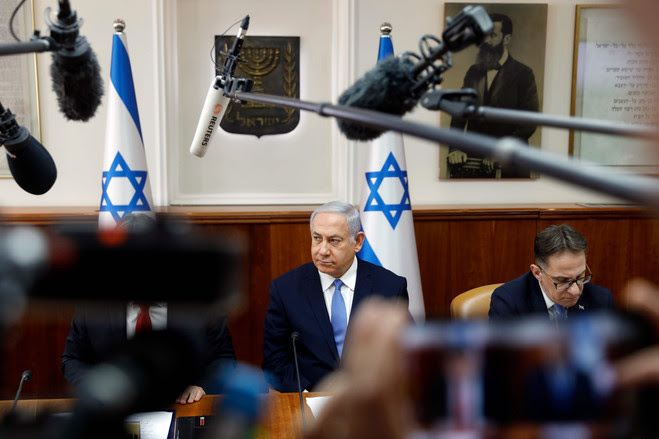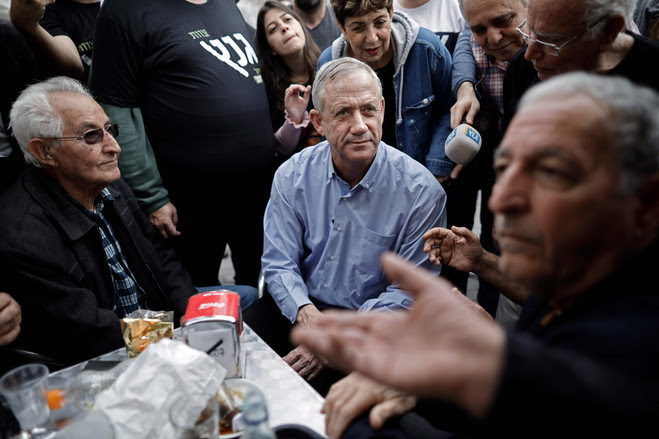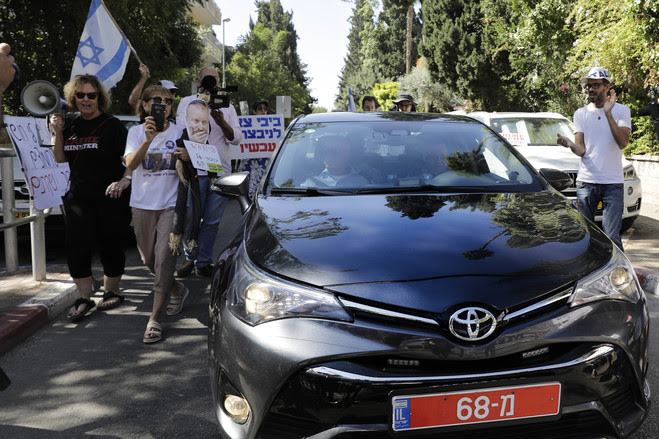By tying political fortunes to the president—complete with campaign posters featuring the two—embattled Israeli premier hopes to solidify base and woo undecided voters, even as possible indictments loom
TEL AVIV—Embattled Israeli Prime Minister Benjamin Netanyahu is putting President Trump at the center of his re-election campaign, aiming to leverage close ties with Washington as he faces pressure from political rivals and a possible indictment on corruption charges.By tying his political fortunes to Mr. Trump, Mr. Netanyahu isn’t only seeking to solidify his base but also to woo undecided voters at a critical juncture of Israel’s election season—and a perilous moment for his tenure as Israel’s prime minister.
Mr. Netanyahu’s Likud party has erected two large posters on the sides of buildings in Jerusalem and Tel Aviv, spanning several stories. They show Messrs. Trump and Netanyahu shaking hands with the campaign slogan: “Netanyahu. In Another League.”
American officials said they didn’t consult with Mr. Netanyahu and his party about the ad, but on Tuesday morning Mr. Trump reposted a photo of it on his Instagram feed. That prompted Mr. Netanyahu’s campaign to share Mr. Trump’s post with reporters, noting that it appeared on his official Instagram account. Mr. Netanyahu thanked Mr. Trump in a tweet for sharing the photo.

Mr. Netanyahu heads a weekly cabinet meeting in Jerusalem on Feb. 3. Photo: ronen zvulun/Agence France-Presse/Getty Images
Mr. Netanyahu’s Likud party also featured Mr. Trump in a political ad released last week, in which Mr. Netanyahu told a cabinet meeting the U.S. Embassy must be moved to Jerusalem. It then showed a May 2018 clip of Mr. Trump congratulating the Israeli people on the embassy move.
“While Trump might be a divisive figure practically anywhere in the world—including the U.S.—he is much less divisive in Israel,” said Reuven Hazan, a political-science professor at Hebrew University in Jerusalem. “His name and embrace, especially for the right wing in Israel, is a positive thing.”
In a survey released by Pew Research Center in October, 69% in Israel said they viewed Mr. Trump positively, up from 56% in 2017. Meanwhile, Mr. Trump’s approval rating among U.S. voters in January was 37%, according to a different survey from Pew, a nonpartisan research center in Washington.
Created with Highcharts 6.0.4Foreign PolicyIsraelis’ confidence in President Trumpranked second highest in a survey of 25nations. Percentage that trust Trump’s handling ofinternational issues Source: Pew Research Center surveys of 25 countriesconducted between May and August 2018 withsample sizes of 915-2,521 people; margin of error: 2.8-5.1 percentage points.
Created with Highcharts 6.0.478%6959564844393532313028
On Tuesday, Mr. Netanyahu’s Likud party held primaries to decide its slate of candidates. Mr. Netanyahu put forward his own suggestions for who he believes can help the party to win enough seats in April to give him a fifth term as prime minister.
Mr. Netanyahu faces a fresh and formidable challenge to his left from Benny Gantz, Israel’s former army chief, who last week launched his campaignand is in talks to join forces with Yair Lapid, head of the centrist Yesh Atid party. It is unclear if the parties will do so, and Mr. Netanyahu remains favored to win the elections.
A recent poll by the Maariv daily places Mr. Netanyahu and his Likud party at the top, netting 31 seats, followed by Mr. Gantz’s party Hosen L’Yisrael with 20 seats and Mr. Lapid’s Yesh Atid party with 12 seats. Usually the party that wins the most seats secures the mandate to form the ruling coalition, which requires 61.
But 20% of Jewish Israelis remain undecided, according to the Jerusalem-based Israel Democracy Institute.

Benny Gantz , center, a retired Israeli general, mingles with people during an electoral campaign tour in the city of Rishon Letzion, south of the coastal city of Tel Aviv, on Feb. 1. Photo: thomas coex/Agence France-Presse/Getty Images
Mr. Netanyahu’s strategy of aligning closely with Mr. Trump could also deflect heat from a state corruption investigation that threatens to make him the first sitting prime minister to be indicted. Attorney General Avichai Mandelblit is expected to announce a decision on charging Mr. Netanyahu in three corruption cases ahead of the elections. He recently rejected a request from Mr. Netanyahu’s lawyers to hold off publishing his decision before the election.
If Mr. Mandelblit decides to indict Mr. Netanyahu, the prime minister will have a chance to defend himself at a hearing, and only after that can the charges be filed. The process is expected to drag on for months or years.
Mr. Netanyahu doesn’t have to step down unless he is ultimately found guilty, and he has vowed to stay in power and fight the charges.
Mr. Trump’s emerging role in Mr. Netanyahu’s campaign may provide political insurance with the prime minister’s base as well. Voters and politicians in Beer Sheva, a Likud stronghold, pointed to Mr. Netanyahu’s friendly relations with powerful leaders, such as the U.S. president, as a selling point to voters.

Israeli protesters hold banners as police arrive at the prime minister’s residence in Jerusalem to question Mr. Netanyahu on Aug. 17. Photo: Tsafrir Abayov/associated press
“President Trump and the Russian president are fighting amongst themselves [over] who will say the name Benjamin Netanyahu more in an interview,” said Shimon Bokr, the 56-year-old deputy mayor of Beer Sheva and head of the city’s Likud branch.
Embracing Mr. Trump also carries risks for Mr. Netanyahu.
The election-season tactic could widen a growing rift between Israel and American Jews, who voted against Mr. Trump in large numbers and many of whom object to Israel’s embrace of him. Mr. Trump faced harsh criticism for his handling of the Pittsburgh shooting in October, prompting Israeli official Naftali Bennett to defend him. The only public official to greet Mr. Trump when he went to the Tree of Life synagogue in Pittsburgh was Israeli ambassador Ron Dermer.
If Mr. Netanyahu wins in April but Mr. Trump loses in 2020, the Israeli prime minister will likely face an uphill battle repairing his relations with a Democratic counterpart. Ties have soured between Democrats and the Israeli government after Mr. Netanyahu publicly lobbied in Congress against the Iran deal.
Mr. Netanyahu is planning to showcase his ties to Mr. Trump weeks before the election, with a visit to Washington in late March and an appearance at the annual American Israel Public Affairs Committee conference. Although American officials say a meeting between the two leaders hasn’t been confirmed, U.S. and Israeli officials said they are likely to meet. Some analysts said the U.S. trip shows how Mr. Netanyahu is separating himself from his challengers.
“Israeli elections are not won on domestic economic or social issues, they are won based on foreign policy and security issues,” said Mr. Hazan, the political-science professor at Hebrew University. “And when it comes to foreign policy there is no country that is more important to Israel than the U.S.”
—Dov Lieber contributed to this article.
Write to Felicia Schwartz at Felicia.Schwartz@wsj.com



Leave a Reply
You must be logged in to post a comment.